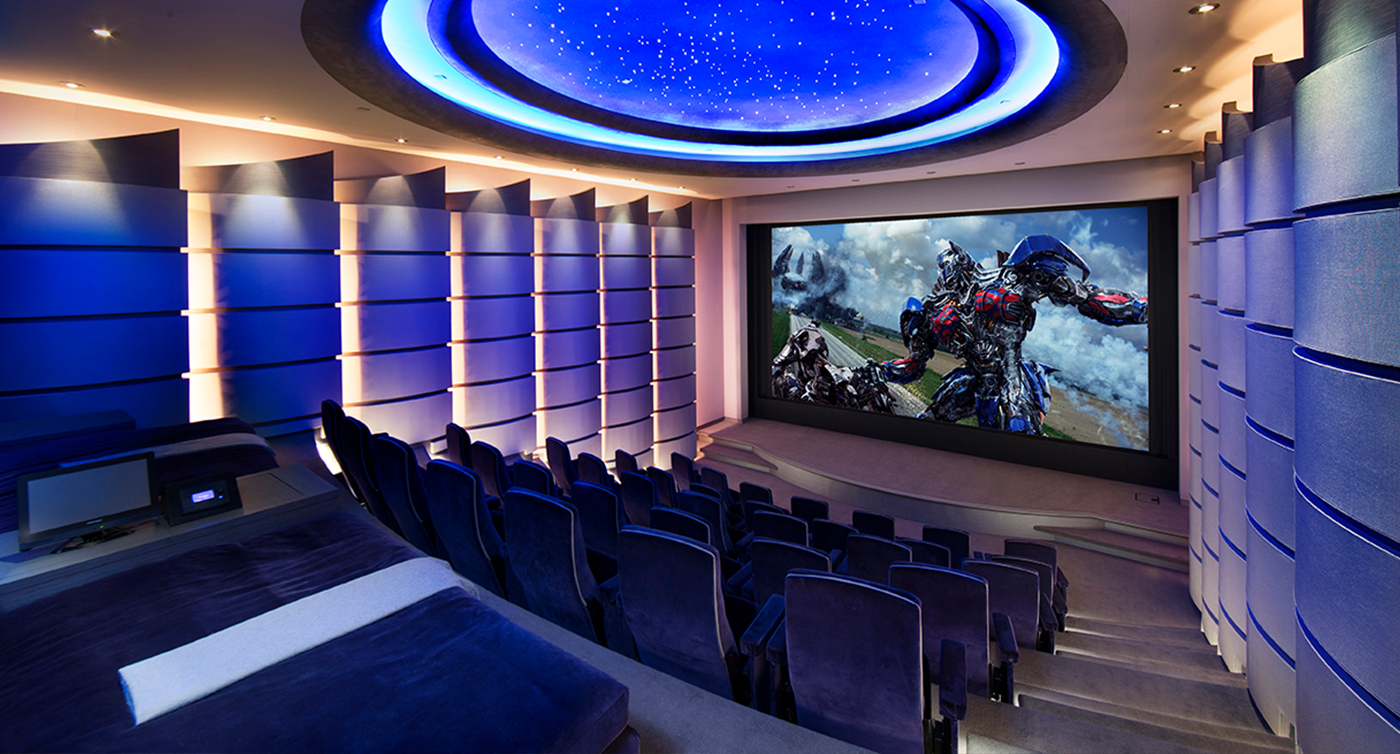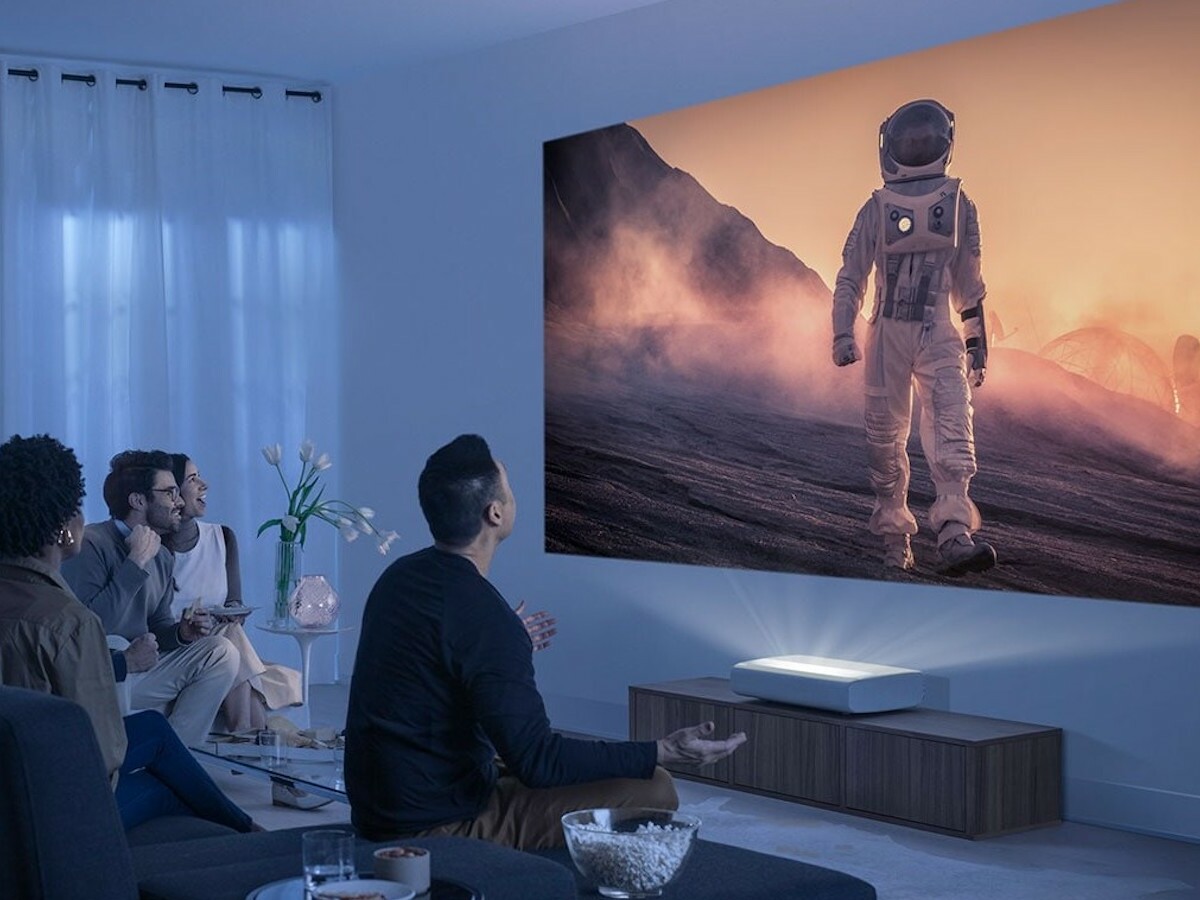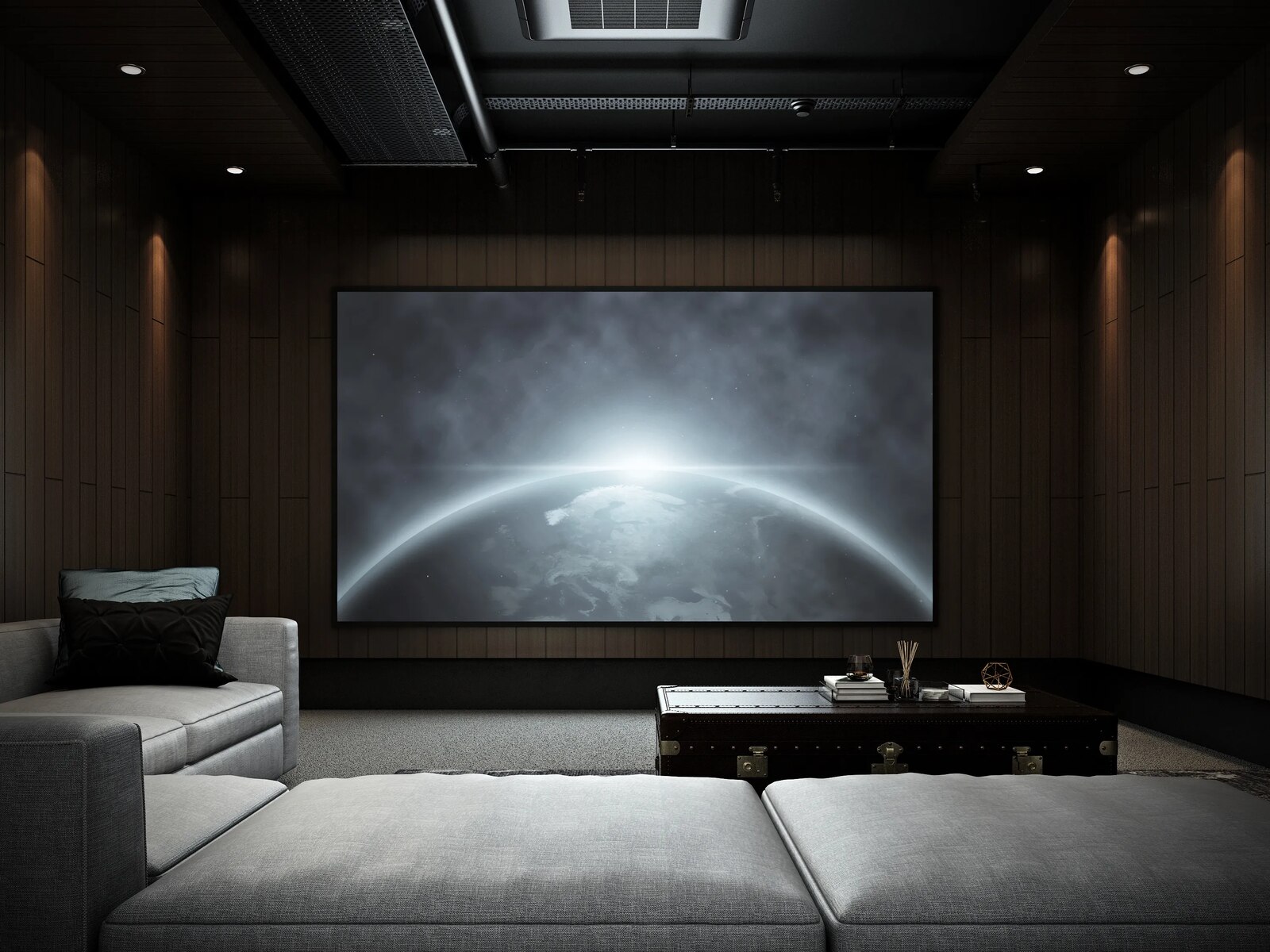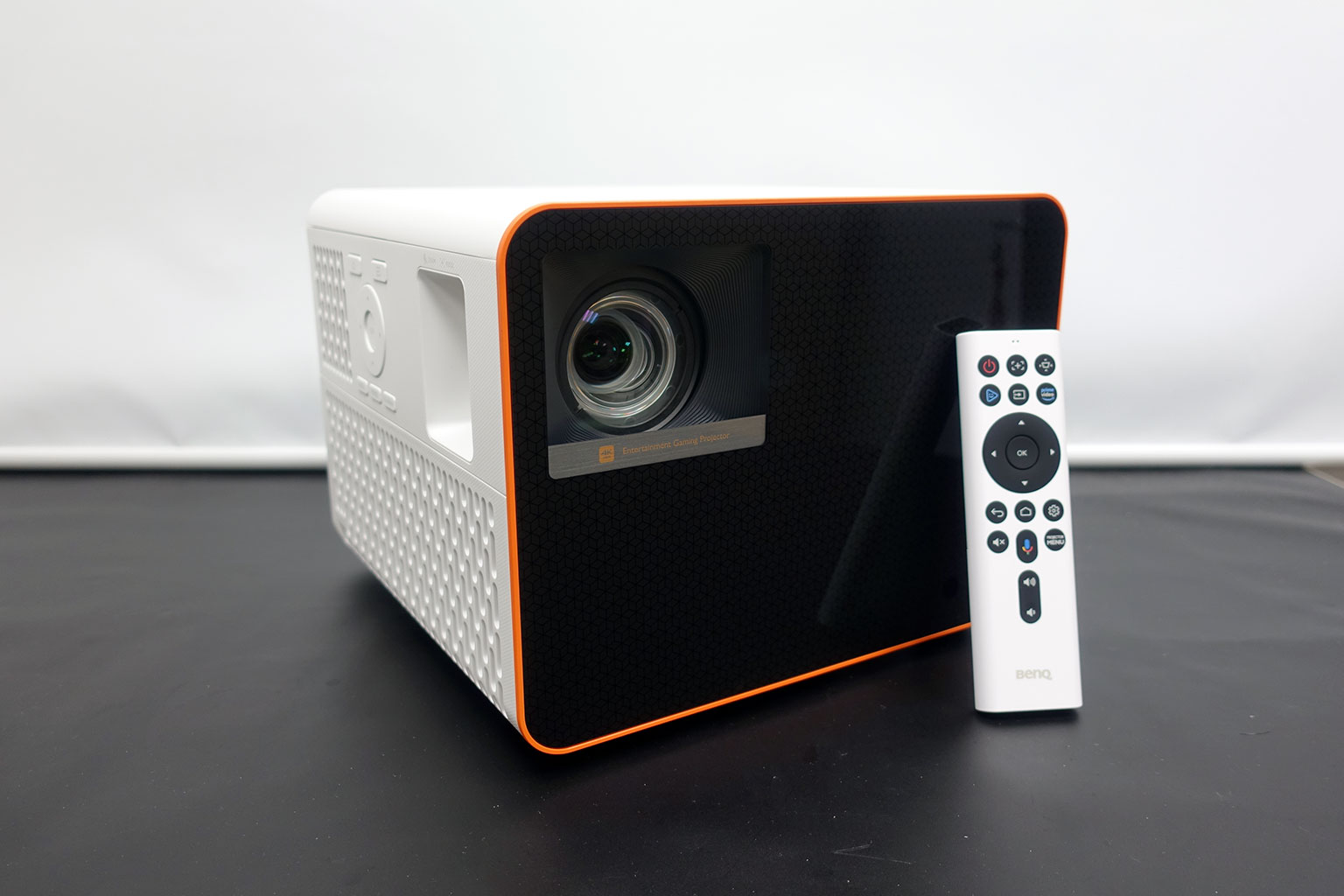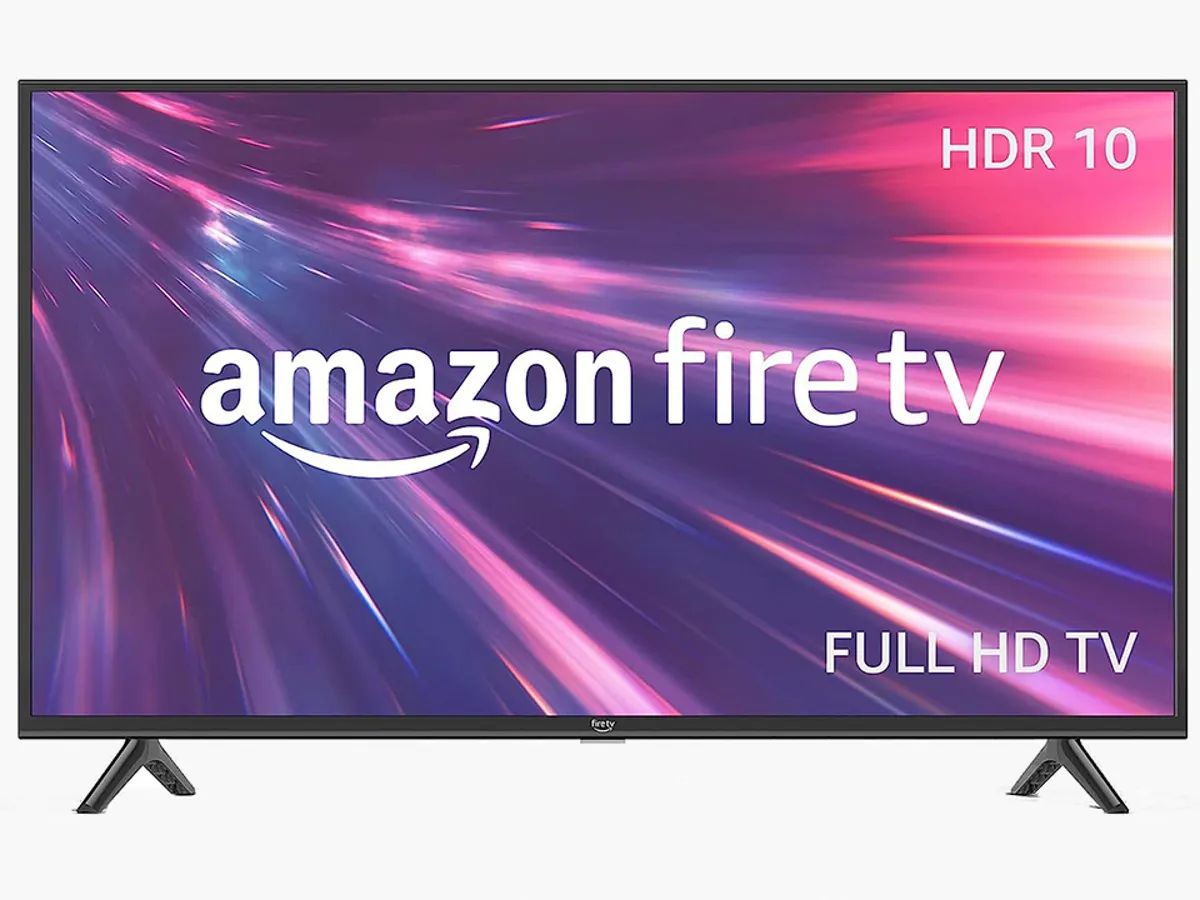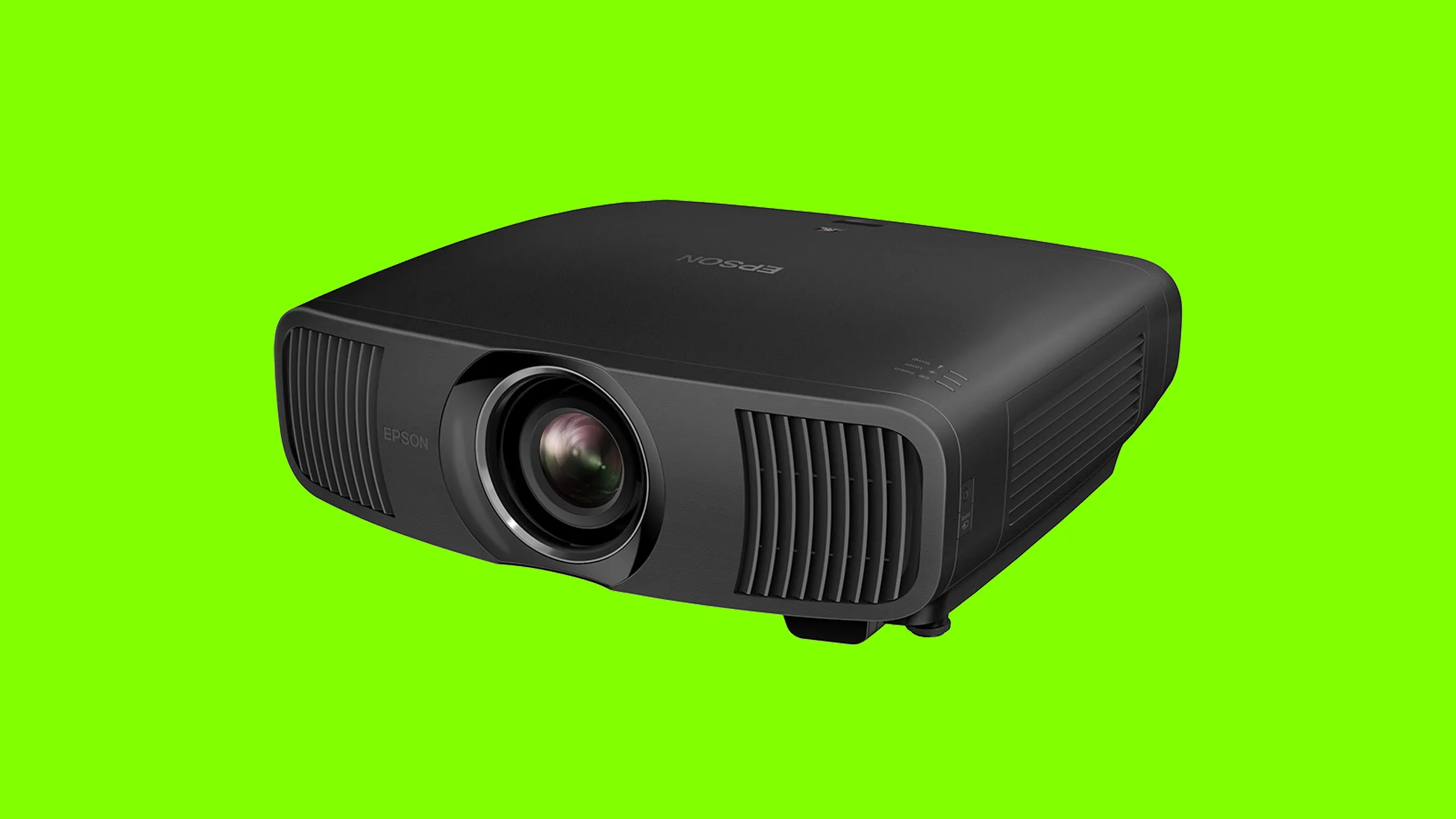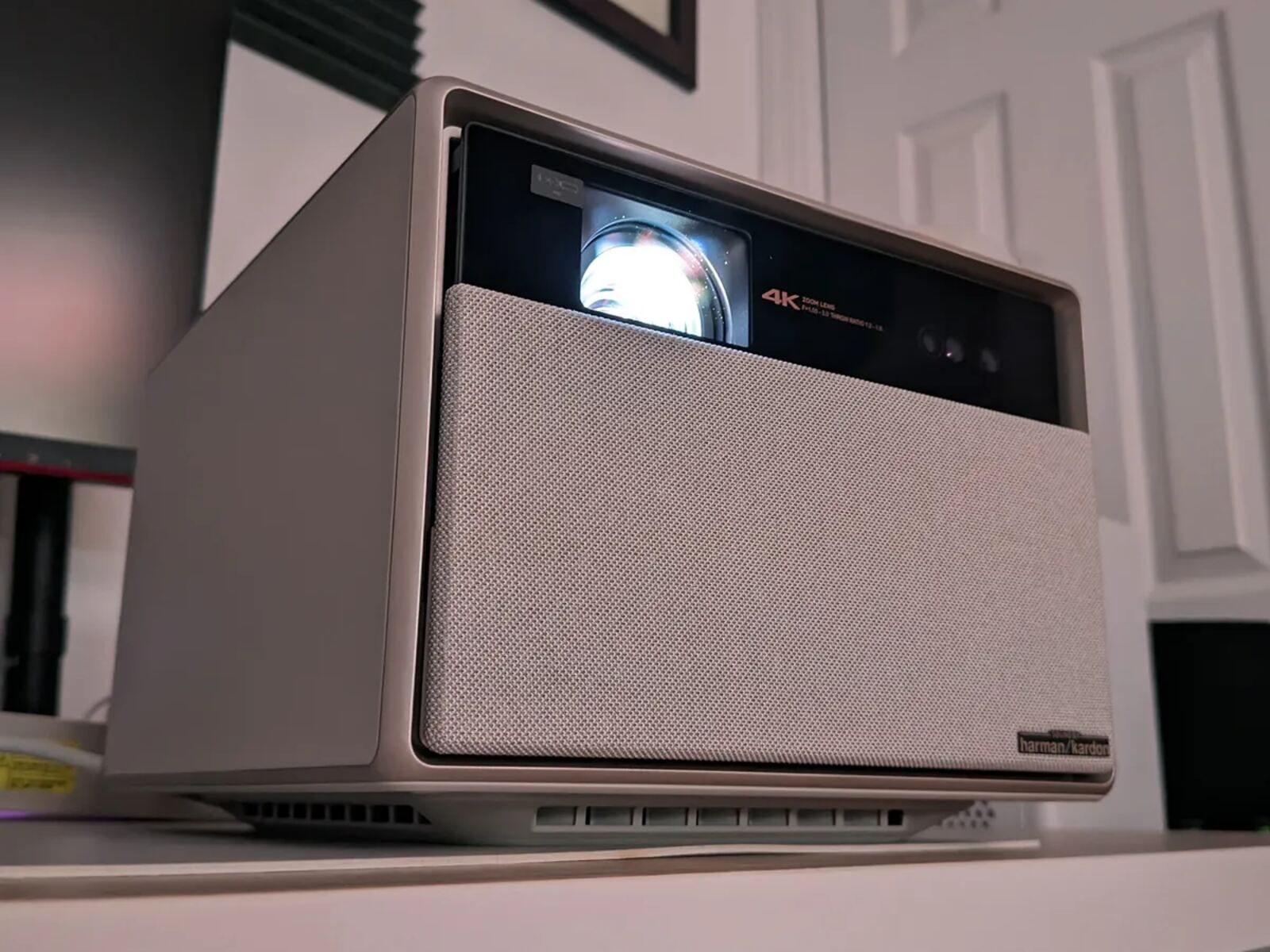Introduction
Welcome to the world of 4K projectors, where stunning visuals come to life in vibrant detail and breathtaking clarity. In this article, we will explore what a 4K projector is and why it is becoming an increasingly popular choice for home theaters, gaming enthusiasts, and professional presentations.
A 4K projector is a type of projector that is capable of displaying images and videos at a resolution of 3840 x 2160 pixels, which is four times the resolution of a standard Full HD (1080p) projector. This high-resolution technology delivers incredibly sharp and lifelike images, enabling viewers to experience every intricate detail with remarkable precision.
With the advancement of technology, 4K projectors have become more accessible and affordable, allowing consumers to bring the cinema experience into their own homes. Whether you’re watching the latest blockbuster movie, playing video games, or giving a presentation, a 4K projector offers an immersive and captivating visual experience that surpasses traditional projection systems.
One of the key benefits of a 4K projector is the ability to showcase content on a much larger screen without compromising image quality. Unlike conventional TVs, which are limited in size, projectors can create cinematic-like experiences on screens measuring over 100 inches diagonally. This larger-than-life display enhances the viewing experience, making it more engaging and enveloping for the audience.
Another advantage of 4K projectors is their ability to reproduce colors with exceptional accuracy and richness. These projectors are often equipped with advanced color technologies, such as HDR (High Dynamic Range), that expand the color gamut and increase contrast, resulting in vibrant and lifelike images. Whether you’re watching a nature documentary or playing a visually stunning video game, a 4K projector will make every color pop off the screen.
Furthermore, 4K projectors offer a versatile range of connectivity options, allowing you to connect various devices like Blu-ray players, gaming consoles, and streaming devices. This versatility enables you to enjoy a wide variety of content, from movies and TV shows to live sports events and online gaming.
In the next section, we will delve deeper into the benefits of a 4K projector and explore the key features to look for when choosing the right one for your needs.
What is a 4K Projector?
A 4K projector is a device that uses advanced technology to project images and videos with a resolution of 3840 x 2160 pixels, also known as 4K resolution. This resolution is four times higher than that of traditional Full HD (1080p) projectors, resulting in incredibly detailed and sharp visuals.
The term “4K” refers to the number of horizontal pixels in the image, which is approximately 4,000 pixels. This high pixel count allows 4K projectors to display images with remarkable clarity, making them ideal for home theaters, gaming setups, and professional presentations where precise detail is crucial.
Compared to standard projectors, 4K projectors offer a significant improvement in resolution. While a 1080p projector can display 2 million pixels, a 4K projector can display over 8 million pixels. This means that each frame of content displayed by a 4K projector contains more information and detail, resulting in a more immersive and lifelike viewing experience.
When it comes to watching movies, a 4K projector truly shines. With its ability to showcase intricate details, vibrant colors, and smooth motion, it can bring the cinematic experience right into your living room. You can enjoy your favorite films like never before, with every nuance and subtlety captured in breathtaking detail.
In the gaming world, 4K projectors open up a whole new level of realism and immersion. Whether you’re exploring an open-world game or engaging in fast-paced action, the 4K resolution ensures that every scene is presented with exceptional clarity and sharpness. Combined with a large projection screen, gaming on a 4K projector can create an incredibly immersive gaming experience that makes you feel like you’re part of the game.
Moreover, 4K projectors are not limited to home use. They are also widely utilized in professional settings, such as boardrooms and conference halls, where delivering impactful visuals is essential. Whether it’s a product demonstration, a business presentation, or a training session, a 4K projector can enhance the quality and impact of the content being displayed, making it more engaging and memorable for the audience.
In summary, a 4K projector is a cutting-edge device that offers an unrivaled level of detail, clarity, and immersion. Whether you’re enjoying movies, gaming, or showcasing professional content, a 4K projector takes the visual experience to a whole new level.
Benefits of a 4K Projector
Investing in a 4K projector comes with a multitude of benefits that enhance your visual experience and elevate your entertainment or professional presentations. Here are some key advantages of using a 4K projector:
1. Unmatched Image Clarity: The primary advantage of a 4K projector is its ability to display images with unparalleled clarity. With four times the resolution of Full HD projectors, you can expect incredibly sharp details and lifelike visuals. Every texture, color, and fine element within the content is rendered with precision, resulting in a truly immersive viewing experience.
2. Larger Screen Size: 4K projectors allow you to indulge in the luxury of a large screen, delivering an authentic cinema-like experience. Whether projecting onto a blank wall or using a dedicated screen, you can enjoy movies, TV shows, and games on a massive canvas, drawing you into the action and amplifying the excitement.
3. Vibrant and Accurate Colors: 4K projectors often incorporate advanced color technologies like High Dynamic Range (HDR), wide color gamut, and precise color calibration. These features result in rich, vibrant, and true-to-life colors that make content visually stunning. From deep blacks to vivid primaries, every hue is reproduced with remarkable fidelity.
4. Improved Contrast and Black Levels: Many 4K projectors utilize technologies such as dynamic iris and local dimming to enhance contrast and black levels. This means that dark scenes appear deeper and more detailed, providing better visibility even in low-light environments. The improved contrast adds depth to the image and enhances the overall visual experience.
5. Immersive Gaming Experience: Gamers can take their gaming setup to the next level with a 4K projector. The high resolution ensures that game worlds are rendered in razor-sharp detail, while the large screen size creates a truly immersive environment. Every detail, movement, and explosion is brought to life, intensifying the gaming experience and pulling you into the game like never before.
6. Versatile Connectivity: 4K projectors come equipped with multiple connectivity options, allowing you to connect a variety of devices such as Blu-ray players, gaming consoles, streaming devices, and laptops. This versatility enables you to enjoy a wide range of content, from streaming your favorite movies and TV shows to playing console games or giving presentations.
7. Future-Proof Investment: With the increasing availability of 4K content, owning a 4K projector ensures that you are prepared for the future. As more movies, TV shows, and games become available in 4K resolution, you can enjoy them in all their glory without having to upgrade your equipment.
Overall, a 4K projector delivers a visually stunning experience that far surpasses traditional projectors. From enjoying cinematic visuals to immersing yourself in gaming worlds and delivering impactful presentations, the benefits of a 4K projector are undeniable.
Key Features to Look for in a 4K Projector
When choosing a 4K projector, there are several key features to consider that can greatly impact your viewing experience. Here are some important factors to keep in mind:
1. Resolution: As the primary characteristic of a 4K projector, resolution is crucial. Ensure that the projector you choose has a native resolution of 3840 x 2160 pixels. This ensures that you will be able to enjoy content in true 4K resolution without any upscaling or loss of quality.
2. Brightness: The brightness of a projector is measured in lumens. For a 4K projector, it is recommended to choose a model with a brightness level of at least 2,000 lumens. This ensures that the image remains clear and vibrant, even in well-lit environments or when projecting onto larger screens.
3. Contrast Ratio: The contrast ratio refers to the difference between the darkest and brightest parts of an image. Look for a projector with a high contrast ratio, as this will enhance the depth and detail in your visuals. A higher contrast ratio provides better image quality, especially in darker scenes.
4. Color Accuracy: A 4K projector with accurate color reproduction is essential for a true-to-life visual experience. Look for projectors that support wide color gamuts, such as Rec. 709 or DCI-P3, as they can display a broader range of colors. Additionally, projectors equipped with technologies like HDR can further enhance color accuracy and vibrancy.
5. Connectivity Options: Consider the connectivity options offered by the 4K projector. Look for HDMI 2.0 or HDMI 2.1 ports, as they support the high bandwidth required for 4K content at higher refresh rates. Additionally, having multiple HDMI ports, USB ports, and wireless connectivity options allows for a flexible and convenient connection to various devices.
6. Keystone Correction: Keystone correction is a feature that helps correct image distortion caused by projecting at an angle. Look for projectors with both vertical and horizontal keystone correction, as this allows for more flexible placement options and ensures a properly proportioned image.
7. Throw Ratio and Zoom: The throw ratio determines the size of the projected image in relation to the distance between the projector and the screen. Consider your available space and the desired screen size, and choose a projector with a throw ratio that suits your needs. Additionally, a projector with adjustable zoom capabilities gives you more control over the size of the projected image.
8. Lamp Life: The lamp life of a projector refers to the estimated lifespan of the projector’s light source. Look for a 4K projector with a long lamp life, typically around 10,000 hours or more, to minimize the need for frequent lamp replacements.
9. Noise Level: Projectors can generate fan noise during operation. Consider the noise level of the projector and look for models that offer quiet operation, especially if you plan to use it in a quiet environment or during movies or presentations with low audio levels.
10. Brand Reputation and Reviews: Lastly, consider the reputation of the brand and read reviews from other users. Look for reliable and well-established brands known for producing high-quality projectors. User reviews can provide valuable insights into the performance and reliability of the projector you are considering.
By considering these key features, you can make an informed decision and select a 4K projector that meets your specific requirements, ensuring a superb visual experience for all your entertainment and presentation needs.
Best 4K Projectors in the Market
With the increasing popularity of 4K projectors, there are several outstanding options available in the market. Here are some of the best 4K projectors that offer impressive features and performance:
1. Sony VPL-VW695ES: This Sony projector delivers breathtaking visuals with its true 4K resolution and excellent contrast ratio. It supports HDR and has a brightness of 1,800 lumens, making it ideal for both dark home theater setups and well-lit rooms.
2. Epson Home Cinema 5050UB: Epson is known for its high-quality projectors, and the Home Cinema 5050UB is no exception. With its advanced 3LCD technology, 4K PRO-UHD resolution, and HDR support, it delivers stunning image quality and accurate colors. It also features a high brightness level of 2,600 lumens.
3. BenQ TK800M: The TK800M from BenQ is a popular choice for sports fans and movie enthusiasts alike. It offers 4K resolution, HDR-PRO technology for enhanced contrast and brightness, and a high brightness level of 3,000 lumens. Its low input lag also makes it suitable for gaming.
4. Optoma UHD50X: The Optoma UHD50X is a versatile 4K projector designed for gaming and home entertainment. It boasts a high refresh rate of 240Hz, low input lag, and HDR10 support. With a brightness level of 3,400 lumens, it performs well even in well-lit environments.
5. LG HU70LA: This LG projector offers both 4K resolution and the convenience of a compact design. Along with HDR support and a brightness level of 1,500 lumens, it features a built-in smart platform for easy access to streaming services.
6. JVC DLA-NX7/RS2000: For those seeking a premium home theater experience, the JVC DLA-NX7/RS2000 is an excellent choice. It boasts a native 4K resolution, exceptional contrast ratio, and support for HDR. With its dynamic iris and high brightness output of 1,900 lumens, it delivers stunning picture quality.
7. ViewSonic X10-4K: The ViewSonic X10-4K is a portable 4K projector that combines excellent image quality with built-in Harman Kardon speakers. Its short throw ratio and 2,400 lumens of brightness make it suitable for small and medium-sized spaces.
These are just a few examples of the best 4K projectors available in the market. When choosing a projector, consider your specific needs, budget, and room requirements to find the perfect fit for your home theater, gaming setup, or professional presentations.
How to Set Up and Use a 4K Projector
Setting up and using a 4K projector may seem daunting, but with the right guidance, it can be a straightforward process. Here are the steps to help you set up and make the most out of your 4K projector:
1. Choose the Right Location: Select a suitable location for your projector, ensuring that there is enough space for the projector and screen. Consider factors such as the distance from the screen, throw distance, and any potential obstructions.
2. Mount or Position the Projector: Install the projector securely on a ceiling mount or place it on a stable surface. Ensure that it is level and properly aligned with the center of the projection screen.
3. Connect the Video Source: Connect your video source, such as a Blu-ray player, gaming console, or streaming device, to the projector using an HDMI cable. Make sure the cable is securely connected to both the source and the projector.
4. Connect the Audio System: If you want to enjoy the sound through an external audio system, connect the audio output from your video source to your speakers or receiver. This can be done through an HDMI ARC (Audio Return Channel) or optical audio connection.
5. Adjust Image Settings: Use the projector’s on-screen menu to adjust the image settings and optimize the picture quality. This may include adjusting the brightness, contrast, color settings, and aspect ratio to achieve the desired image display.
6. Focus and Keystone Correction: Use the projector’s focus ring to obtain a sharp image. If the projected image is distorted due to the projector’s angle, use the keystone correction feature to correct the distortion and ensure a properly proportioned image.
7. Set up the Screen: Mount or position the projection screen based on your desired screen size and the dimensions of your room. Ensure that the screen is taut and flat to avoid any wrinkles or distortion that may affect the image quality.
8. Test and Adjust: Once everything is set up, test the projection and make any necessary adjustments to the image, audio, or positioning. Test different content types, such as movies, games, and presentations, to ensure optimal viewing quality.
9. Lighting Conditions: Consider the lighting conditions in the room where the projector is installed. While a dedicated home theater is best kept completely dark, if you have ambient light, you may need to adjust the brightness settings or consider using ambient light-rejecting screens to improve contrast and image visibility.
10. Maintenance and Care: Follow the manufacturer’s guidelines for proper maintenance and care of your 4K projector. Regularly clean the air filters, ensure proper ventilation, and replace the projector lamp when needed to optimize performance and longevity.
By following these steps, you can successfully set up and use your 4K projector, immersing yourself in stunning visuals and enjoying a cinematic experience from the comfort of your own home.
Tips for Maximizing the Performance of a 4K Projector
To ensure you get the best performance and optimal visual experience from your 4K projector, consider these helpful tips:
1. Use High-Quality Content: Take full advantage of your projector’s capabilities by using high-quality 4K content. Opt for 4K Blu-ray discs, streaming platforms that offer 4K content, or video games optimized for 4K resolution.
2. Calibrate Color and Image Settings: Calibrate your projector’s color and image settings to obtain accurate color reproduction and optimal image quality. Use calibration tools or professional calibration services to achieve the best results.
3. Ensure Proper Ventilation: Projectors generate heat during operation. Ensure that the projector has sufficient ventilation and keep it in a well-ventilated area to prevent overheating and prolong the lifespan of the device.
4. Consider Ambient Lighting: Evaluate the ambient lighting conditions in your viewing space. Minimize or eliminate ambient light to enhance contrast and improve image quality. Use curtains, blinds, or ambient light-rejecting screens to create a dark viewing environment.
5. Optimize Screen Placement: Properly position and install the projection screen for optimal viewing. Ensure the screen is flat, taut, and positioned at the correct height and angle to maximize image quality and reduce distortion.
6. Regularly Clean the Projector and Air Filters: Dust can accumulate on the lens and the projector’s body, affecting image quality. Clean the lens and outer surfaces regularly using a soft, lint-free cloth. Additionally, clean or replace the projector’s air filters as recommended by the manufacturer to maintain proper airflow and prevent overheating.
7. Control Ambient Noise: Minimize ambient noise in your viewing space to enhance the overall viewing experience. Consider soundproofing measures or using a quality audio system that can deliver immersive sound without distractions.
8. Upgrade HDMI Cables: Ensure that you are using high-quality HDMI cables that support 4K resolution and HDMI 2.0 or 2.1 specifications. This will ensure reliable and high-bandwidth connectivity between the projector and video source for optimal image quality.
9. Position the Projector Correctly: Position the projector at the proper distance and angle to achieve the desired screen size and image quality. Follow the manufacturer’s guidelines for optimal throw distance and projection alignment.
10. Keep Firmware and Software Updated: Regularly check for firmware and software updates for your projector. These updates often include performance improvements, bug fixes, and new features that can enhance the overall performance and functionality of your 4K projector.
By following these tips, you can maximize the performance of your 4K projector, ensuring a superb visual experience that brings your favorite movies, games, and presentations to life with stunning clarity, vibrant colors, and immersive details.
Frequently Asked Questions about 4K Projectors
As 4K projectors continue to gain popularity, many questions arise regarding their features, performance, and use. Here are some frequently asked questions about 4K projectors, along with their answers:
Q: What is the difference between 4K and 1080p projectors?
A: The main difference lies in the resolution. 4K projectors have a resolution of 3840 x 2160 pixels, which is four times the resolution of a 1080p projector (1920 x 1080 pixels). This means that 4K projectors offer a much higher level of detail and clarity in the displayed content.
Q: Is there enough 4K content available?
A: Yes, the availability of 4K content has been steadily increasing. Many streaming services like Netflix, Amazon Prime Video, and Disney+ offer a wide range of movies and shows in 4K resolution. Additionally, 4K Blu-ray discs and video games optimized for 4K are becoming more prevalent.
Q: Can I watch regular HD content on a 4K projector?
A: Yes, 4K projectors are backward compatible and can display content with lower resolutions, including regular HD (1080p) content. The projector will upscale the content to fit its native 4K resolution, although the quality improvement over a dedicated 1080p projector may not be as noticeable.
Q: Do I need a special screen for a 4K projector?
A: While a special screen is not mandatory, using a high-quality projection screen designed for 4K content can enhance the overall image quality, color accuracy, and contrast. These screens are often built to deliver optimal performance with 4K projectors, minimizing artifacts and improving the viewing experience.
Q: Are 4K projectors suitable for gaming?
A: Yes, 4K projectors can provide an immersive gaming experience. With their high resolution, accurate color reproduction, and low input lag features, they are capable of displaying games with stunning details and vibrant colors. However, it is important to choose a projector with a high refresh rate and low input lag specifically designed for gaming.
Q: Do I need a special HDMI cable for a 4K projector?
A: It is recommended to use high-quality HDMI cables that support 4K resolution and are compliant with HDMI 2.0 or 2.1 specifications. These cables can handle the increased bandwidth required for 4K content, ensuring a reliable and high-quality connection between the projector and video source.
Q: How long does a 4K projector lamp last?
A: Lamp life can vary depending on the projector model and usage patterns. On average, 4K projector lamps have a lifespan of around 2,000 to 5,000 hours. However, some projectors offer eco-mode options that extend the lamp life further. It’s important to follow the manufacturer’s guidelines for lamp usage and replacement.
Q: Can I use a 4K projector during daylight?
A: While using a 4K projector in daylight is possible, it can impact image quality due to increased ambient light levels. To achieve the best results, it is recommended to create a darker viewing environment by using curtains, blinds, or ambient light-rejecting screens to enhance contrast and visibility.
These are just a few common questions about 4K projectors. If you have specific inquiries or concerns, it’s always advisable to refer to the manufacturer’s documentation or consult with a trusted expert for personalized guidance.
Conclusion
4K projectors have revolutionized the way we experience visual content, offering unparalleled clarity, detail, and immersion. With their ability to deliver stunning visuals and create cinematic-like experiences, 4K projectors have become a popular choice for home theaters, gaming setups, and professional presentations.
These projectors, with their 3840 x 2160 pixel resolution, provide four times the level of detail compared to traditional Full HD projectors, resulting in sharper images and lifelike visuals. The benefits of 4K projectors extend beyond resolution, with features like vibrant and accurate colors, improved contrast ratios, and versatile connectivity options.
When setting up and using a 4K projector, proper location selection, screen placement, and image calibration are crucial to maximizing performance. Considering factors like ambient lighting, ventilation, and connectivity options are important steps to ensure the best viewing experience.
There are several exceptional 4K projectors available in the market that deliver outstanding performance. From renowned brands like Sony, Epson, and BenQ, to more compact and portable options, there is a projector to suit every need and budget.
As the availability of 4K content continues to grow, 4K projectors enable us to immerse ourselves in a world of high-definition movies, TV shows, video games, and professional presentations. By following tips for optimizing performance and addressing frequently asked questions, users can confidently enjoy the stunning visuals and immersive experiences offered by 4K projectors.
So, whether you’re a movie enthusiast looking to create a home theater, a gamer seeking a more immersive gaming setup, or a professional in need of visually captivating presentations, a 4K projector can elevate your visual experience to new heights.
Embrace the power of 4K resolution and indulge in the awe-inspiring world of vivid colors, fine details, and larger-than-life visuals that 4K projectors provide.









